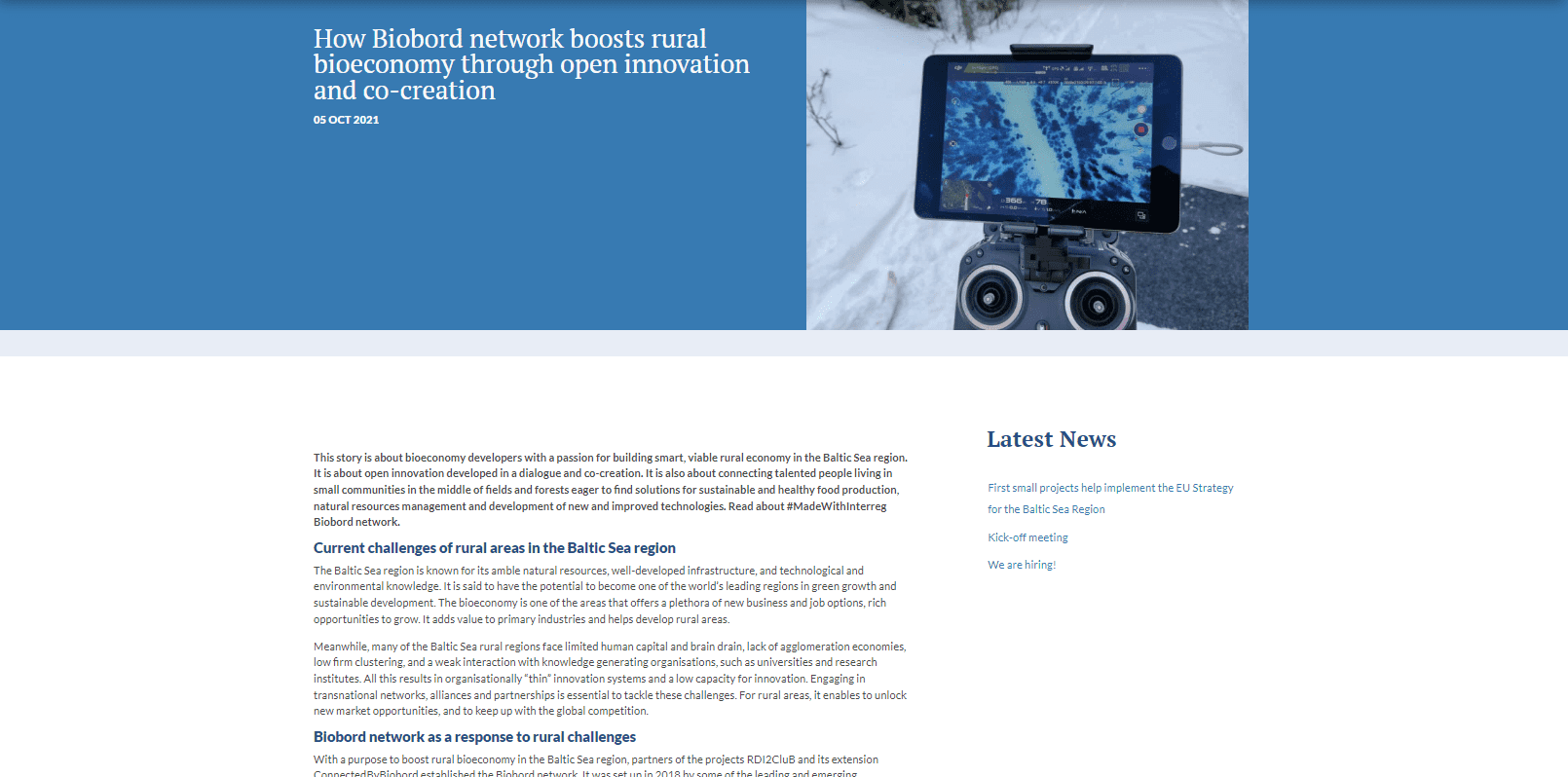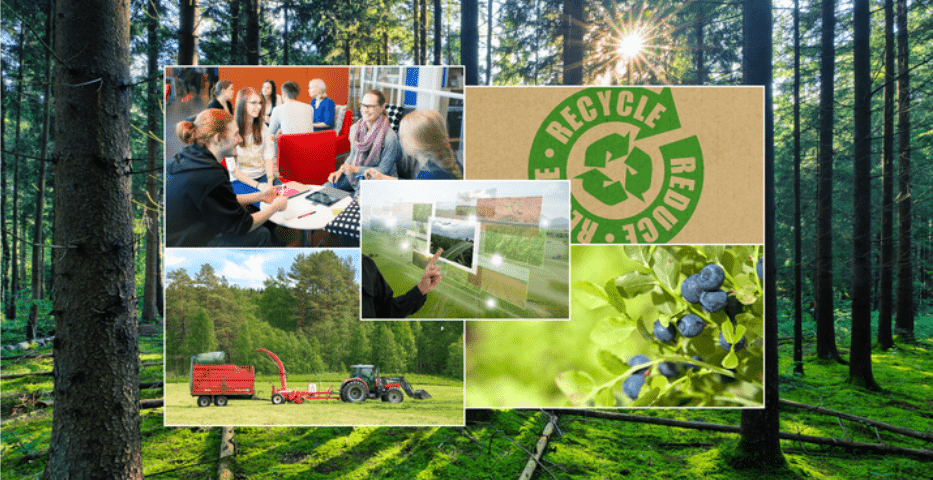ConnectedByBiobord
The rural areas of the Baltic Sea region have a great potential for bioeconomy as they have abundant natural resources. However, these regions struggle to reach their full potential due to limited human capital, business networks and clusters. So far, the small and medium-size enterprises (SMEs) in bioeconomy are mostly in traditional, resource-based industries that have not taken full advantage of latest technology and service innovations. The regional knowledge exchange is generally limited and occurs mainly among local actors. Limited human capital, lack of agglomeration economies, low levels of firm clustering and a weak endowment with knowledge generation organizations are characteristic of organizationally thin regional innovation systems (RIS).
ConnectedByBiobord was a continuation of the project RDI2CluB that supported smart, sustainable and inclusive growth of the bioeconomy in rural areas. ConnectedByBiobord built on the outputs of the RDI2CluB: Joint Action Plans and the Biobord platform for transnational innovation co-operation. The partnership implemented transnational innovation pilots derived from the Joint Action Plan in target regions, namely: Central Finland (Finland), Inland (Norway), Świętokrzyskie Voivodeship (Poland), Vidzeme (Latvia), Värmland (Sweden), Skåne (Sweden) and Pärnu (Estonia).
Budgets
in numbers
-
0.90MillionTotal
-
0.56MillionErdf
-
0.00MillionEni + Russia
-
0.10MillionNorway
Achievements
Bioeconomy actors get better connected
ConnectedByBiobord strengthened regional innovation systems by connecting actors on the regional level. Bioeconomy actors across the region were connected to each other in innovation events, where they learned from each other and gained new knowledge. The project used the digital Biobord platform that is a place for knowledge exchange as well as practical cooperation plans to trigger peer learning. Besides, external actors have learned a new way to host innovations through co-creation (i.e. hackathons). In this way, the involved actors have learned where to find transnational contacts (Biobord) and where to start the co-creation (joint agendas and Biobord network).
Bioeconomy potential
Through piloting, the project introduced the regional innovation systems to the most promising bioeconomy sub-sectors such as sustainable food system, digital forestry, new technologies in wild animal monitoring. Via OnStage webinars, the involved participants gained knowledge via open data. With new knowledge and tools, the bioeconomy actors can develop products and services, initiate new knowledge-based jobs.
Collaboration between business and research
In addition, the project strengthened the dialogue between business and research. ConnectedByBiobord piloted an open co-creation model and delivered a vast amount of valuable knowledge that allows to tackle the challenges blocking innovations and development. For example, a customer attitude towards alternative protein, which would require nationwide marketing campaigns and incentives from the policy level. In practice, the model combines research and business in development activities.
Outputs
Publication on Bioeconomy Innovation Pilots

Guide on the innovation process for transnational innovation ecosystems

Project Stories
-
05.10.2021
How Biobord network boosts rural bioeconomy through open innovation and co-creation
This story is about bioeconomy developers with a passion for building smart, viable rural economy in the Baltic Sea region. It is about open innovation developed in a dialogue and co-creation. It is also about connecting talented people living in small communities in the middle of fields and forests eager to find solutions for sustainable and healthy food production, natural resources management and development of new and improved technologies. Read about #MadeWithInterreg Biobord network.Read full story
Partners
JAMK University of Applied Sciences
- TownTarvaala
- RegionKeski-Suomi
- CountryFinland
- RepresentativeRiikka Kumpulainen
- Phone
- E-Mail
- Web
Krinova Incubator & Science Park
- TownKristianstad
- RegionSkåne län
- CountrySweden
- RepresentativeDiana Danilda
- Phone
- E-Mail
- Web
Vidzeme Planning Region
- TownCēsis, Cēsu novads
- RegionVidzeme
- CountryLatvia
- RepresentativeIrīna Kulitāne
- Phone
- E-Mail
- Web
Inland Norway University of Applied Sciences
- TownElverum
- RegionHedmark
- CountryNorway
- RepresentativeEirik Messelt
- Phone
- E-Mail
- Web
Institute for Environmental Solutions
- TownPriekuļi parish, Priekuli county
- RegionVidzeme
- CountryLatvia
- RepresentativeRoberts Rotbergs
- Phone
- E-Mail
- Web
Tretorget Ltd
- TownElverum
- RegionHedmark
- CountryNorway
- RepresentativeStåle Nordgaard
- Phone
- E-Mail
- Web
Stockholm Environment Institute Tallinn Centre
- TownTallinn
- RegionPõhja-Eesti
- CountryEstonia
- RepresentativeKaja Peterson
- Phone
- E-Mail
- Web
The Paper Province economic association
- TownKarlstad
- RegionVärmlands län
- CountrySweden
- RepresentativeMagnus Persson
- Phone
- E-Mail
- Web
Foundation for Education and Social Dialogue PRO CIVIS
- TownKielce
- RegionKielecki
- CountryPoland
- RepresentativeEwelina Piotrowska
- Phone
- E-Mail
- Web
-
Project managerRiikka KumpulainenJyväskylä University of Applied Sciences
-
Legal representativeVesa SaarikoskiJAMK University of Applied Sciences
-
Financial managerTeemu RiikonenJAMK University of Applied Sciences
-
Communication managerRiikka KumpulainenJyväskylä University of Applied Sciences



